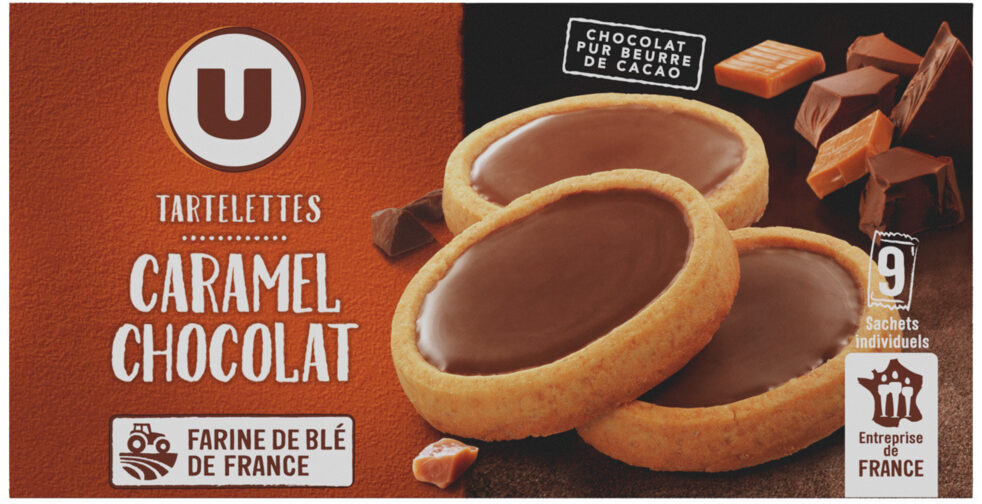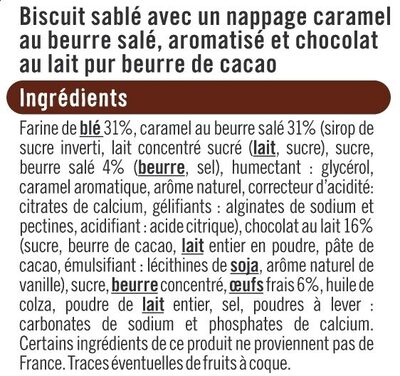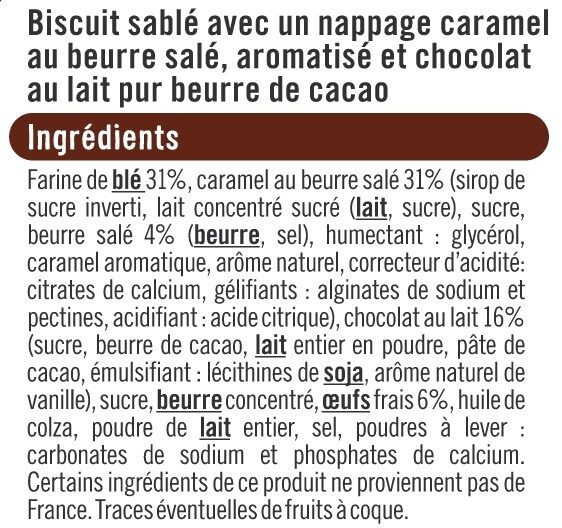Help us make food transparency the norm!
As a non-profit organization, we depend on your donations to continue informing consumers around the world about what they eat.
The food revolution starts with you!
Tartelettes au caramel et au chocolat au lait - U - 125 g
Tartelettes au caramel et au chocolat au lait - U - 125 g
This product page is not complete. You can help to complete it by editing it and adding more data from the photos we have, or by taking more photos using the app for Android or iPhone/iPad. Thank you!
×
Some of the data for this product has been provided directly by the manufacturer Système U.
Barcode: 3256223668658 (EAN / EAN-13)
Common name: Biscuits sablés avec un nappage caramel au beurre salé et de chocolat au lait pur beurre de cacao
Quantity: 125 g
Packaging: Plastic, Cardboard, Pack
Brands: U
Categories: Snacks, Sweet snacks, Biscuits and cakes, Biscuits, fr:Tartelettes au caramel
Labels, certifications, awards: No palm oil, Transformed in France, fr:Farine de blé français
Stores: U Express, Magasins U
Countries where sold: France
Matching with your preferences
Health
Ingredients
-
38 ingredients
: Farine de ble 31%, caramel au beurre salé 31% (sirop de sucre inverti, lait concentré sucré (lait, sucre), sucre, beurre salé 4% (beurre, sel), humectant : glycérol, caramel aromatique, arôme naturel, correcteur d'acidité: citrates de calcium, gélifiants : alginates de sodium et pectines, acidifiant : acide citrique), chocolat au lait 16% (sucre, beurre de cacao, lait entier en poudre, pâte de cacao, émulsifiant : lécithines de soja, arôme naturel de vanille), sucre, beurre concentré, oeufs frais 6%, huile de colza, poudre de lait entier, sel, poudres à lever : carbonates de sodium et phosphates de calcium. traces éventuelles de fruits à coqueAllergens: Eggs, Gluten, Milk, SoybeansTraces: Nuts
Food processing
-
Ultra processed foods
Elements that indicate the product is in the 4 - Ultra processed food and drink products group:
- Additive: E322 - Lecithins
- Additive: E401 - Sodium alginate
- Additive: E422 - Glycerol
- Additive: E440 - Pectins
- Ingredient: Emulsifier
- Ingredient: Flavouring
- Ingredient: Gelling agent
- Ingredient: Humectant
- Ingredient: Invert sugar
Food products are classified into 4 groups according to their degree of processing:
- Unprocessed or minimally processed foods
- Processed culinary ingredients
- Processed foods
- Ultra processed foods
The determination of the group is based on the category of the product and on the ingredients it contains.
Additives
-
E322 - Lecithins
Lecithins are natural compounds commonly used in the food industry as emulsifiers and stabilizers.
Extracted from sources like soybeans and eggs, lecithins consist of phospholipids that enhance the mixing of oil and water, ensuring smooth textures in various products like chocolates, dressings, and baked goods.
They do not present any known health risks.
-
E322i - Lecithin
Lecithins are natural compounds commonly used in the food industry as emulsifiers and stabilizers.
Extracted from sources like soybeans and eggs, lecithins consist of phospholipids that enhance the mixing of oil and water, ensuring smooth textures in various products like chocolates, dressings, and baked goods.
They do not present any known health risks.
-
E330 - Citric acid
Citric acid is a natural organic acid found in citrus fruits such as lemons, oranges, and limes.
It is widely used in the food industry as a flavor enhancer, acidulant, and preservative due to its tart and refreshing taste.
Citric acid is safe for consumption when used in moderation and is considered a generally recognized as safe (GRAS) food additive by regulatory agencies worldwide.
-
E333 - Calcium citrates
Calcium citrate: Calcium citrate is the calcium salt of citric acid. It is commonly used as a food additive -E333-, usually as a preservative, but sometimes for flavor. In this sense, it is similar to sodium citrate. Calcium citrate is also found in some dietary calcium supplements -e.g. Citracal-. Calcium makes up 24.1% of calcium citrate -anhydrous- and 21.1% of calcium citrate -tetrahydrate- by mass. The tetrahydrate occurs in nature as the mineral Earlandite.Source: Wikipedia
-
E341 - Calcium phosphates
Calcium phosphate: Calcium phosphate is a family of materials and minerals containing calcium ions -Ca2+- together with inorganic phosphate anions. Some so-called calcium phosphates contain oxide and hydroxide as well. They are white solids of nutritious value.Source: Wikipedia
-
E422 - Glycerol
Glycerol: Glycerol -; also called glycerine or glycerin; see spelling differences- is a simple polyol compound. It is a colorless, odorless, viscous liquid that is sweet-tasting and non-toxic. The glycerol backbone is found in all lipids known as triglycerides. It is widely used in the food industry as a sweetener and humectant and in pharmaceutical formulations. Glycerol has three hydroxyl groups that are responsible for its solubility in water and its hygroscopic nature.Source: Wikipedia
-
E440 - Pectins
Pectins (E440) are natural carbohydrates, predominantly found in fruits, that act as gelling agents in the food industry, creating the desirable jelly-like texture in jams, jellies, and marmalades.
Pectins stabilize and thicken various food products, such as desserts, confectioneries, and beverages, ensuring a uniform consistency and quality.
Recognized as safe by various health authorities, pectins have been widely used without notable adverse effects when consumed in typical dietary amounts.
-
E500 - Sodium carbonates
Sodium carbonates (E500) are compounds commonly used in food preparation as leavening agents, helping baked goods rise by releasing carbon dioxide when they interact with acids.
Often found in baking soda, they regulate the pH of food, preventing it from becoming too acidic or too alkaline. In the culinary world, sodium carbonates can also enhance the texture and structure of foods, such as noodles, by modifying the gluten network.
Generally recognized as safe, sodium carbonates are non-toxic when consumed in typical amounts found in food.
Ingredients analysis
-
May contain palm oil
Ingredients that may contain palm oil: Butterfat
-
Non-vegan
Non-vegan ingredients: Sweetened condensed milk, Milk, Salted butter, Butter, Milk chocolate, Whole milk powder, Butterfat, Fresh egg, Whole milk powder
-
Vegetarian status unknown
Unrecognized ingredients: Salted butter caramel
-
Details of the analysis of the ingredients
: Farine de ble 31%, caramel au beurre salé 31% (sirop de sucre inverti, lait concentré sucré (lait, sucre), sucre, beurre salé 4% (beurre, sel), humectant (glycérol), caramel aromatique, arôme naturel, correcteur d'acidité (citrates de calcium), gélifiants (alginates de sodium, pectines), acidifiant (acide citrique)), chocolat au lait 16% (sucre, beurre de cacao, lait entier en poudre, pâte de cacao, émulsifiant (lécithines de soja), arôme naturel de vanille), sucre, beurre concentré, oeufs frais 6%, huile de colza, poudre de lait entier, sel, poudres à lever (carbonates de sodium, phosphates de calcium)- Farine de ble -> en:wheat-flour - vegan: yes - vegetarian: yes - ciqual_proxy_food_code: 9410 - percent_min: 31 - percent: 31 - percent_max: 31
- caramel au beurre salé -> en:salted-butter-caramel - percent_min: 31 - percent: 31 - percent_max: 31
- sirop de sucre inverti -> en:invert-sugar-syrup - vegan: yes - vegetarian: yes - percent_min: 4 - percent_max: 19
- lait concentré sucré -> en:sweetened-condensed-milk - vegan: no - vegetarian: yes - ciqual_proxy_food_code: 19051 - percent_min: 4 - percent_max: 11.5
- lait -> en:milk - vegan: no - vegetarian: yes - ciqual_proxy_food_code: 19051 - percent_min: 2 - percent_max: 11.5
- sucre -> en:sugar - vegan: yes - vegetarian: yes - ciqual_proxy_food_code: 31016 - percent_min: 0 - percent_max: 5.75
- sucre -> en:sugar - vegan: yes - vegetarian: yes - ciqual_proxy_food_code: 31016 - percent_min: 4 - percent_max: 9
- beurre salé -> en:salted-butter - vegan: no - vegetarian: yes - ciqual_food_code: 16403 - percent_min: 4 - percent: 4 - percent_max: 4
- beurre -> en:butter - vegan: no - vegetarian: yes - ciqual_proxy_food_code: 16400 - percent_min: 3.35 - percent_max: 4
- sel -> en:salt - vegan: yes - vegetarian: yes - ciqual_food_code: 11058 - percent_min: 0 - percent_max: 0.65
- humectant -> en:humectant - percent_min: 0 - percent_max: 4
- glycérol -> en:e422 - vegan: maybe - vegetarian: maybe - percent_min: 0 - percent_max: 4
- caramel aromatique -> en:aromatic-caramel - vegan: yes - vegetarian: yes - percent_min: 0 - percent_max: 4
- arôme naturel -> en:natural-flavouring - vegan: maybe - vegetarian: maybe - percent_min: 0 - percent_max: 3.8
- correcteur d'acidité -> en:acidity-regulator - percent_min: 0 - percent_max: 3.16666666666667
- citrates de calcium -> en:e333 - vegan: yes - vegetarian: yes - percent_min: 0 - percent_max: 3.16666666666667
- gélifiants -> en:gelling-agent - percent_min: 0 - percent_max: 2.71428571428571
- alginates de sodium -> en:e401 - vegan: yes - vegetarian: yes - percent_min: 0 - percent_max: 2.71428571428571
- pectines -> en:e440a - vegan: yes - vegetarian: yes - percent_min: 0 - percent_max: 1.35714285714286
- acidifiant -> en:acid - percent_min: 0 - percent_max: 2.375
- acide citrique -> en:e330 - vegan: yes - vegetarian: yes - percent_min: 0 - percent_max: 2.375
- chocolat au lait -> en:milk-chocolate - vegan: no - vegetarian: yes - ciqual_food_code: 31004 - percent_min: 16 - percent: 16 - percent_max: 16
- sucre -> en:sugar - vegan: yes - vegetarian: yes - ciqual_proxy_food_code: 31016 - percent_min: 2.66666666666667 - percent_max: 16
- beurre de cacao -> en:cocoa-butter - vegan: yes - vegetarian: yes - ciqual_food_code: 16030 - percent_min: 0 - percent_max: 8
- lait entier en poudre -> en:whole-milk-powder - vegan: no - vegetarian: yes - ciqual_food_code: 19021 - percent_min: 0 - percent_max: 5.33333333333333
- pâte de cacao -> en:cocoa-paste - vegan: yes - vegetarian: yes - ciqual_proxy_food_code: 16030 - percent_min: 0 - percent_max: 4
- émulsifiant -> en:emulsifier - percent_min: 0 - percent_max: 3.2
- lécithines de soja -> en:soya-lecithin - vegan: yes - vegetarian: yes - ciqual_food_code: 42200 - percent_min: 0 - percent_max: 3.2
- arôme naturel de vanille -> en:natural-vanilla-flavouring - vegan: yes - vegetarian: yes - percent_min: 0 - percent_max: 2.66666666666667
- sucre -> en:sugar - vegan: yes - vegetarian: yes - ciqual_proxy_food_code: 31016 - percent_min: 6 - percent_max: 10
- beurre concentré -> en:butterfat - vegan: no - vegetarian: yes - from_palm_oil: maybe - ciqual_food_code: 16401 - percent_min: 6 - percent_max: 10
- oeufs frais -> en:fresh-egg - vegan: no - vegetarian: yes - ciqual_food_code: 22000 - percent_min: 6 - percent: 6 - percent_max: 6
- huile de colza -> en:colza-oil - vegan: yes - vegetarian: yes - from_palm_oil: no - ciqual_food_code: 17130 - percent_min: 0 - percent_max: 4
- poudre de lait entier -> en:whole-milk-powder - vegan: no - vegetarian: yes - ciqual_food_code: 19021 - percent_min: 0 - percent_max: 3.33333333333333
- sel -> en:salt - vegan: yes - vegetarian: yes - ciqual_food_code: 11058 - percent_min: 0 - percent_max: 0.65
- poudres à lever -> en:raising-agent - percent_min: 0 - percent_max: 0.65
- carbonates de sodium -> en:e500 - vegan: yes - vegetarian: yes - percent_min: 0 - percent_max: 0.65
- phosphates de calcium -> en:e341 - vegan: yes - vegetarian: yes - percent_min: 0 - percent_max: 0.325
en:wheat-flour -> en:wheat-flour
Nutrition
-
Bad nutritional quality
⚠ ️Warning: the amount of fruits, vegetables and nuts is not specified on the label, it was estimated from the list of ingredients: 0This product is not considered a beverage for the calculation of the Nutri-Score.
Positive points: 2
- Proteins: 3 / 5 (value: 5.5, rounded value: 5.5)
- Fiber: 2 / 5 (value: 2.1, rounded value: 2.1)
- Fruits, vegetables, nuts, and colza/walnut/olive oils: 0 / 5 (value: 0, rounded value: 0)
Negative points: 24
- Energy: 5 / 10 (value: 2001, rounded value: 2001)
- Sugars: 7 / 10 (value: 33, rounded value: 33)
- Saturated fat: 10 / 10 (value: 14, rounded value: 14)
- Sodium: 2 / 10 (value: 260, rounded value: 260)
The points for proteins are not counted because the negative points are greater or equal to 11.
Nutritional score: (24 - 2)
Nutri-Score:
-
Nutrient levels
-
Fat in high quantity (23%)
What you need to know- A high consumption of fat, especially saturated fats, can raise cholesterol, which increases the risk of heart diseases.
Recommendation: Limit the consumption of fat and saturated fat- Choose products with lower fat and saturated fat content.
-
Saturated fat in high quantity (14%)
What you need to know- A high consumption of fat, especially saturated fats, can raise cholesterol, which increases the risk of heart diseases.
Recommendation: Limit the consumption of fat and saturated fat- Choose products with lower fat and saturated fat content.
-
Sugars in high quantity (33%)
What you need to know- A high consumption of sugar can cause weight gain and tooth decay. It also augments the risk of type 2 diabetes and cardio-vascular diseases.
Recommendation: Limit the consumption of sugar and sugary drinks- Sugary drinks (such as sodas, fruit beverages, and fruit juices and nectars) should be limited as much as possible (no more than 1 glass a day).
- Choose products with lower sugar content and reduce the consumption of products with added sugars.
-
Salt in moderate quantity (0.65%)
What you need to know- A high consumption of salt (or sodium) can cause raised blood pressure, which can increase the risk of heart disease and stroke.
- Many people who have high blood pressure do not know it, as there are often no symptoms.
- Most people consume too much salt (on average 9 to 12 grams per day), around twice the recommended maximum level of intake.
Recommendation: Limit the consumption of salt and salted food- Reduce the quantity of salt used when cooking, and don't salt again at the table.
- Limit the consumption of salty snacks and choose products with lower salt content.
-
-
Nutrition facts
Nutrition facts As sold
for 100 g / 100 mlAs sold
per serving (14 g)Compared to: fr:Tartelettes au caramel Energy 2,001 kj
(478 kcal)280 kj
(66 kcal)-0% Fat 23 g 3.22 g -5% Saturated fat 14 g 1.96 g -1% Carbohydrates 62 g 8.68 g +6% Sugars 33 g 4.62 g -3% Fiber 2.1 g 0.294 g +58% Proteins 5.5 g 0.77 g -3% Salt 0.65 g 0.091 g +18% Fruits‚ vegetables‚ nuts and rapeseed‚ walnut and olive oils (estimate from ingredients list analysis) 0 % 0 %
Environment
-
Eco-Score C - Moderate environmental impact
⚠ ️Select a country in order to include the full impact of transportation.The Eco-Score is an experimental score that summarizes the environmental impacts of food products.→ The Eco-Score was initially developped for France and it is being extended to other European countries. The Eco-Score formula is subject to change as it is regularly improved to make it more precise and better suited to each country.Life cycle analysis
-
Average impact of products of the same category: B (Score: 69/100)
Category: Biscuit (cookie)
Category: Biscuit (cookie)
- PEF environmental score: 0.35 (the lower the score, the lower the impact)
- including impact on climate change: 2.88 kg CO2 eq/kg of product
Stage Impact Agriculture
80.5 %Processing
11.8 %Packaging
3.1 %Transportation
3.2 %Distribution
1.4 %Consumption
0.0 %
Bonuses and maluses
-
Origins of ingredients with a high impact
Malus: -2
Environmental policy: -2
Transportation: 0
Origin of the product and/or its ingredients % of ingredients Impact Unknown 69 %High France 31 %Medium
-
Packaging with a medium impact
Malus: -11
Shape Material Recycling Impact Packet Plastic High Packet Cardboard Low
Eco-Score for this product
-
Impact for this product: C (Score: 56/100)
Product: Tartelettes au caramel et au chocolat au lait - U - 125 g
Life cycle analysis score: 69
Sum of bonuses and maluses: -13
Final score: 56/100
-
Carbon footprint
-
Equal to driving 1.5 km in a petrol car
288 g CO² per 100g of product
The carbon emission figure comes from ADEME's Agribalyse database, for the category: Biscuit (cookie) (Source: ADEME Agribalyse Database)
Stage Impact Agriculture
82.9 %Processing
7.9 %Packaging
3.8 %Transportation
4.7 %Distribution
0.7 %Consumption
0.0 %
Packaging
-
Packaging with a medium impact
-
Packaging parts
Packet (Plastic)
Packet (Cardboard)
-
Packaging materials
Material % Packaging weight Packaging weight per 100 g of product Paper or cardboard Plastic Total
-
Transportation
-
Origins of ingredients
Origins of ingredients with a high impact
Origin of the product and/or its ingredients % of ingredients Impact Unknown 69 %High France 31 %Medium
Report a problem
-
Incomplete or incorrect information?
Category, labels, ingredients, allergens, nutritional information, photos etc.
If the information does not match the information on the packaging, please complete or correct it. Open Food Facts is a collaborative database, and every contribution is useful for all.
Data sources
Product added on by sebleouf
Last edit of product page on by moon-rabbit.
Product page also edited by ecoscore-impact-estimator, kiliweb, org-systeme-u, packbot, systeme-u, systeme-u-off, tacite, teolemon.










